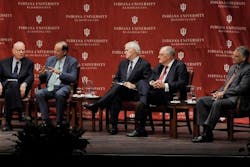9/11 Panel Members: U.S. Remains Vulnerable
BLOOMINGTON, Ind. -- Former members of the 9/11 commission warned Thursday that despite efforts during the last decade to make American cities safer from terrorist attacks, the U.S. has failed to protect itself in at least three key areas and remains vulnerable to cyberterrorism and "lone wolf" terrorists.
Committee members said the U.S. must develop better bomb detection technology, has not adequately improved radio equipment to allow police and fire departments nationwide to better communicate and has yet to develop a national identification card that could add another barrier to terrorists trying to slip into the country.
Former Illinois Gov. James Thompson said he worries that terrorists from afar could hack into computers, crippling banks, businesses and key utilities while throwing the nation into disarray.
"You read stories day after day about some 18-year-old Romanian hacker getting in and playing havoc with banks, public offices, so think about what some of the rogue state actors might be doing," Thompson said.
Thompson and eight other members of the 10-member 9/11 commission disbanded in 2004 after recommending steps the nation could make to ward off terrorism gathered on the Indiana University campus for a two-hour discussion before about 800 students and others.
The wide-ranging discussion led by moderator Ken Bode included several commissioners recalling the important role that the families of those who died in the terrorists attacks in New York, Washington and Pennsylvania played in prodding Congress to form the panel.
Jamie Gorelick, who served as deputy attorney general under President Bill Clinton, said the families of many of nearly 3,000 people who died in the attacks closely watched the commission's work because they wanted answers that could prevent a repeat of the attacks.
"The effect of the families being very engaged in what we were doing was very profound," she said. "We asked the tough questions because we knew the people were watching us. ... We very much felt that the weight of history was on our shoulders."
Slade Gorton, a former U.S. Sen. from Washington, also credited the 9/11 families with getting both the panel formed and making sure all the key questions were addressed.
"They were on our backs the whole time. They wanted accountability. They certainly spurred our activities," Gorton said.
Some of the former commission members lamented the lack of the same nonpartisan, unified spirit that swept across the nation in the wake the 2001 attacks, saying the nation needs that same passionate commitment now with the current partisan divisions in Washington.
"I don't think we can be safe if we are as divided as we are today," Gorelick said.
Commission members said many of their recommendations are now reality but that some key ones — including better communications for police and fire — are still undone a decade later.
"Lives were lost on 9/11 because the police and fire could not talk to each other. That is still true today in most of America. Ten years later, Congress has not settled on a solution," Thompson said.
"Ten years is long enough."
Thompson also said that hijackers like those who crashed planes in New York, Washington and Pennsylvania could still get state IDs today despite efforts to create uniform standards for identification.
He said the 9/11 Commission's 2004 report called for federal identification standards, but that those haven't succeeded because of civil liberties concerns and states' desire to guard their own processes.
"Our credit card companies know more about us than the government does," he said. "We ought to grow up and say hey, we're facing the kind of threat in America we have never, ever faced before. We have to adopt measures we have never, ever considered before."
Thompson also said that the nation remains vulnerable to "lone wolf" terrorists who act on their own, sharing their plans for an attack with no one — and therefore beyond the reach of being detected by the nation's intelligence-gathering agencies beefed up after 9/11.
"The lone wolf operative, a single person, radicalized by what they see on the Internet or hear at mosques, is going to be a greater threat to the U.S. today than on 9/11," he said.
Former U.S. Rep. Lee Hamilton of Indiana, who was committee vice chairman, said he that while the nation has seen progress screening airline passengers he said that despite millions of dollars spent on screening the nation still lacks the technology to quickly and accurately detect explosives, including those that might be hidden inside a terrorist's body.
"That's the big gap in passenger screening right now," he said.
The discussion had its lighter moments, including when former Nebraska U.S. Sen. Bob Kerrey told the gathering that former U.S. Secretary of State Henry Kissinger had turned down an offer to chair the commission.
"I guess it would have been known as the Kissinger Commission, not the 9/11 commission if he had accepted," Kerrey said, sparking laughter in the crowd.




